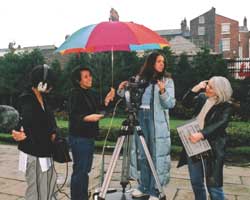
| HOME |
| NERVE |
| REVIEWS |
| ARCHIVE |
| EVENTS |
| LINKS |
| ABOUT US |
| CONTRIBUTORS |
| BACK ISSUES |
| CONTACT US |
Women's Independent Cinema House
By Alan Thomson
 WITCH
must rank as probably Liverpool’s oldest media training organisation.
Run with a passionate belief in the creativity of women and the need for
serious opportunities for those from ethnic minorities, Project Manager
Ann Carney explains her vision for the future, and the barriers facing
black women in the film/TV industries.
WITCH
must rank as probably Liverpool’s oldest media training organisation.
Run with a passionate belief in the creativity of women and the need for
serious opportunities for those from ethnic minorities, Project Manager
Ann Carney explains her vision for the future, and the barriers facing
black women in the film/TV industries.
How long has WITCH been going?
I’ve been with WITCH for 17 years to get more women involved with filming. The important thing is to get women behind cameras rather than in front of them. Because women are traditionally used to being viewed as an object and not in control. In our first year we got money from the council to screen films made by women for women. We ran video and animation courses by the old Open Eye art gallery in Whitechapel. In 1991, we did a project called ‘Just the Job’ about black people and employment. Since then we have been steadily transforming ourselves. Originally, we had no equipment and had to hire it for when we went into schools to train. In 1993, we received money of the ESF (European Social Fund) and moved to Holme’s building and then Blackburne House, and we finally ended up here in Rodney Street! I’m the Full time Project Manager. WITCH has two full-time and one part-time staff.
Tell us about some of your productions.
We’ve done two productions in the 1990s that got a lot of acclaim, and were shown on mainstream TV. Seize the Time in 1997 and a biography of Cathy Tyson in 1995. Seize the Time was a ten-minute short shown on Channel 4.
What courses are you running at the moment?
We’ve got a customised media placement programme where women get to work with production companies, and more than half our placements get jobs in the media industry afterwards. We have an outreach project for culturally diverse women, where we do things like teach Yemeni and Somali women how to use equipment, and a fifteen-week video production course accredited by Mersey College Network. We go through a process of developing communication and research skills so that our attendees can make a sort of show-reel. Then potential companies get to watch them and pick them for placements.
In terms of women’s positions within the film and TV industry, how radical is your remit?
WITCH is there to address imbalance. I don’t think the industry has changed at all in its attitudes in the general sense. To start with, in Liverpool you have the basic problem that many companies have been lost, such as Channel 1, Granada Shopping and Planet Wild, and filmmakers do not employ local people, apart from taxis and catering. The industry itself is undoubtedly male-dominated. WITCH provides childcare for example. That is so important and so few production companies take that on board. WITCH is about providing role models. How many black women are there in the industry? We’re not trying to live in the eighties here, but things haven’t changed at all. As regards black faces in the media, people say they don’t apply for the jobs, but the important question is, why don’t they apply for the jobs?
WITCH’s placement programme is great because it gives experience. The video course we run is more like a foundation programme so the students can decide what to do, i.e. whether to continue at college or to get work outside. The sad thing for Liverpool though is that there are no jobs. How do you keep these qualified women in Merseyside? This is with film companies bringing in outside labour when they produce in Liverpool. There’s enough qualified people to do any job in Liverpool. And if they’re not qualified… Train ‘em!
Tel: 0151 707 0539 or email: mediawitch@hotmail.com